

Learning theory (education) A classroom in Norway.
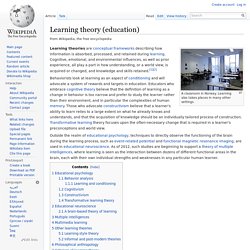
Learning also takes places in many other settings. Learning theories are conceptual frameworks describing how information is absorbed, processed, and retained during learning. Cognitive, emotional, and environmental influences, as well as prior experience, all play a part in how understanding, or a world view, is acquired or changed, and knowledge and skills retained.[1][2] Main article: Behaviorism The term "behaviorism" was coined by John Watson (1878–1959). Methodological behaviorism is based on the theory of treating public events, or observable behavior.
In behavior analysis, learning is the acquisition of a new behavior through conditioning and social learning. There are two types of conditioning and learning: Classical conditioning was noticed by Ivan Pavlov when he saw that if dogs come to associate the delivery of food with a white lab coat or with the ringing of a bell, they will produce saliva, even when there is no sight or smell of food.
Heutagogy and lifelong learning: A review of heutagogical practice and self-determined learning. Lisa Marie Blaschke Oldenburg University and University of Maryland University College (UMUC) Abstract Heutagogy, a form of self-determined learning with practices and principles rooted in andragogy, has recently resurfaced as a learning approach after a decade of limited attention.
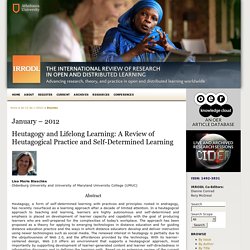
In a heutagogical approach to teaching and learning, learners are highly autonomous and self-determined and emphasis is placed on development of learner capacity and capability with the goal of producing learners who are well-prepared for the complexities of today’s workplace. The approach has been proposed as a theory for applying to emerging technologies in distance education and for guiding distance education practice and the ways in which distance educators develop and deliver instruction using newer technologies such as social media. The renewed interest in heutagogy is partially due to the ubiquitousness of Web 2.0, and the affordances provided by the technology. Introduction Research Method. Authors: Ben Betts. What is a learning ecology? The concept of learning ecology helps us to go beyond a simplistic, gadget-oriented view of technology.
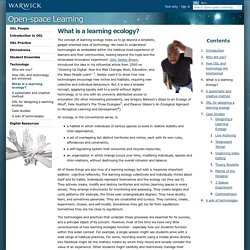
We need to understand technologies as embedded within the habitual lived experience of learners and their communities, looking beyond the hype and the showcased innovation experiment. John Seeley Brown, introduced the idea in his influential article from 2000 on "Growing Up Digital: How the Web Changes Work, Education, and the Ways People Learn" 1. Seeley used it to show how new technologies encourage new niches and habitats, requiring new collective and individual behaviours. But it is also a broader concept, appplying equally well to a world without digital technology, or to one with an unevenly distributed access to innovation (for other interesting precedents, see Gregory Bateson's Steps to an Ecology of Mind2, Felix Guattari's The Three Ecologies3, and Eleanor Gibson's An Ecological Approach to Perceptual Learning and Development4).
MOVING FROM PEDAGOGY TO ANDRAGOGY. (Adapted and Updated from Hiemstra, R., & Sisco, B. (1990).
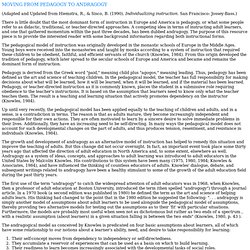
Individualizing instruction. San Francisco: Jossey-Bass.) There is little doubt that the most dominant form of instruction in Europe and America is pedagogy, or what some people refer to as didactic, traditional, or teacher-directed approaches. A competing idea in terms of instructing adult learners, and one that gathered momentum within the past three decades, has been dubbed andragogy.
The purpose of this resource piece is to provide the interested reader with some background information regarding both instructional forms. The pedagogical model of instruction was originally developed in the monastic schools of Europe in the Middle Ages. Pedagogy is derived from the Greek word "paid," meaning child plus "agogos," meaning leading.
Up until very recently, the pedagogical model has been applied equally to the teaching of children and adults, and in a sense, is a contradiction in terms. Anderson, M. Brookfield, S. (1984). From Andragogy to Heutagogy. Author: Stewart Hase and Chris Kenyon (2001) Southern Cross University Keywords: Southern Cross University, pedagogy, andragogy, heutagogy, higher education, vocational education, self-determined learning.
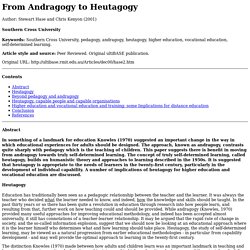
Article style and source: Peer Reviewed. Original ultiBASE publication. Original URL: Contents Abstract In something of a landmark for education Knowles (1970) suggested an important change in the way in which educational experiences for adults should be designed. Heutagogy Education has traditionally been seen as a pedagogic relationship between the teacher and the learner.